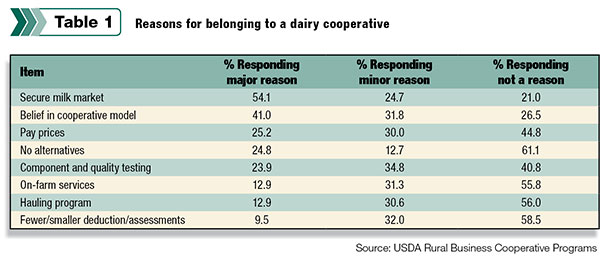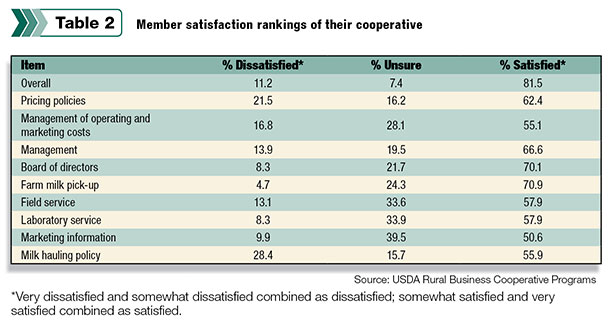Why do dairy farmers belong to a milk marketing cooperative? With which areas of the cooperative are members most satisfied or dissatisfied? What factors most influence that level of satisfaction? Do cooperative members think they can influence their cooperative?
A recently released research paper by the USDA’s Rural Business Cooperative Programs provides answers to these and other similar questions. The paper titled, “Member Satisfaction With Their Cooperatives: Insights from Dairy Farmers,” reports the results of dairy cooperative member surveys conducted between 1993 and 2012.
This article looks at the paper’s findings, which I consider the most helpful and insightful to cooperative leadership. These findings should help management and directors understand, respond to and better serve their dairy farmer members.
Let’s start by looking at why a dairy farmer belongs to a cooperative. As seen in Table 1, the major reason for belonging to a cooperative is a secure market for milk production. More than 50 percent of the respondents listed this as the major reason.

This may surprise some as being the number one reason, and in fact, it initially surprised me. However, when I recall my conversations with dairy cooperative pioneers, I understand why it is the number one reason. These pioneers explained to me that before belonging to a cooperative, they did not know if their milk would be picked up the next day.
If the milk was picked up, would the butterfat test be accurate? Would the milk check come? If the check came, would it be returned for insufficient funds? They correctly believed the cooperative helped overcome and spread the risk of these uncertainties in marketing milk. Even today, those uncertainties are in the minds of many dairy farmers.
Second on the list for belonging is belief in the cooperative model. Dairy farmers understand and see the importance of “cooperating” in milk marketing, which relates back to the number one reason.
When it comes to pay price (third on the list), only 25 percent listed it as a major reason for belonging to a cooperative, while almost 45 percent said pay price was not a reason for belonging to the cooperative. Surprisingly, not having an alternative market was a major reason for only 25 percent.
Level of satisfaction
The surveys asked how satisfied members were with a variety of items. As seen in Table 2, a majority of members were satisfied with all items. More than 80 percent of respondents are satisfied, overall, with their cooperative. In a related survey question, only 11.6 percent of respondents would leave their cooperative if an alternative was available.

Except for the overall item, a high percentage of the responses are in the unsure category. From the perspective of a former cooperative CEO, this raises some questions. Did dairy farmers mark unsure to keep from having to say they were dissatisfied?
Or do cooperatives need to provide more education and communication to members in these areas? It is probably a combination of both. From my experience, most dairy farmers would have an opinion in these areas.
Looking at pricing policies, more than 62 percent are satisfied with that aspect of their cooperative. However, additional survey questions provide more insight into members’ thoughts on milk pricing. When it comes to fairness, about 60 percent of the respondents agreed the cooperative paid members fairly.
On the other hand, less than 31 percent agreed the cooperative’s practice of paying different milk prices by area is justified. And less than half agreed the cooperative did a good job of marketing milk and returning the best price. Based on these responses, it appears more education and improvement is needed in milk pricing.
Over the years, many cooperatives, through consolidation and growth, have expanded the geographical areas they serve. Do members agree with this? More than 55 percent did not think their cooperative covered too big an area; 16 percent thought the cooperative did, with the remaining 29 percent unsure.
What about influence? Are members satisfied with the influence they have in their cooperative? Less than 45 percent of the members were satisfied with the amount of influence they have on how the cooperative is run.
In response to a similar question, only about 38 percent thought members had a great amount of influence on the running of the cooperative. It would be interesting to see this response by size of cooperative. Does level of influence decline or stay the same as cooperatives grow in size?
Bottom line
The most important parts of the USDA study are the factors that very strongly correlate with overall member satisfaction. In other words, what parts of the cooperative have the greatest influence on a member being satisfied? At the top of the list are management and pricing policies, including returning the best price for milk.
If a member is satisfied with the cooperative’s management and pricing policies, then there is a very strong likelihood the member is satisfied overall with the cooperative. This is followed by management of operating and marketing costs and the board of directors.
Combining the USDA study and my own experience working with cooperatives, the following is the bottom line as I see it. Dairy farmers belong to a cooperative to have a secure market for their milk production and because they believe in the cooperative model. Members want their cooperative managed well – with competent and accessible management.
They expect the cooperative to be overseen by a good board of directors who watch the purse strings, establish policies and hold management accountable. Operating costs should be watched closely and prudently, and milk marketed for the best return possible. If this is accomplished, members are satisfied with their cooperative. PD
Calvin Covington is a retired dairy cooperative CEO and now does some farming, consulting, writing and public speaking.

Calvin Covington
Retired Dairy Cooperative CEO







